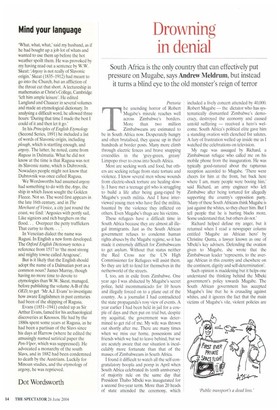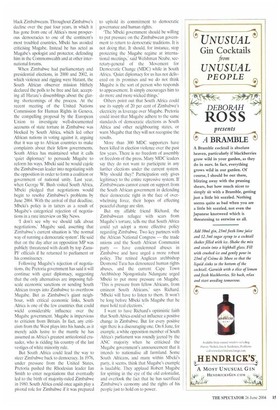Drowning in denial
South Africa is the only country that can effectively put pressure on Mugabe, says Andrew Meldrum, but instead it turns a blind eye to the old monster's reign of terror
Pretoria
The unending horror of Robert Mugabe's misrule reaches well across Zimbabwe's borders. More than two million Zimbabweans are estimated to be in South Africa now. Desperately hungry and often brutalised, they queue up in their hundreds at border posts. Many more climb through electric fences and brave snapping crocodiles in the 'grey-green, greasy' Limpopo river to cross into South Africa.
Most are seeking work and food, but others are seeking refuge from state torture and violence. I know several men whose wounds from electric-shock torture are healing slowly. I have met a teenage girl who is struggling to build a life after being gang-raped by Mugabe's youth militia. And I have interviewed young men who have fled the militia, haunted by the violence they inflicted on others. Even Mugabe's thugs are his victims.
These refugees have a difficult time in South Africa because they are almost all illegal immigrants. Just as the South African government refuses to condemn human rights abuses by the Mugabe regime, so it has made it extremely difficult for Zimbabweans to get asylum. Without that status neither the Red Cross nor the UN High Commissioner for Refugees will assist them. So they are left to fend for themselves in the netherworld of the streets.
I, too, am in exile from Zimbabwe. One year ago 1 was abducted by Mugabe's secret police, held incommunicado for 10 hours and illegally forced on to a plane out of the country. As a journalist I had contradicted the state propaganda's rosy view of events. A year earlier I had been held in jail for a couple of days and then put on trial but, despite my acquittal, the government was determined to get rid of me. My wife was thrown out shortly after me. There are many times when we miss our home, possessions and friends which we had to leave behind, but we are acutely aware that our situation is incalculably more fortunate than that of the masses of Zimbabweans in South Africa.
I found it difficult to watch all the self-congratulatory hoopla and pomp in April when South Africa celebrated its tenth anniversary of majority rule on the same day that President Thabo Mbeki was inaugurated for a second five-year term. More than 20 heads 1 of state attended the ceremony, which included a lively concert attended by 40,000. Robert Mugabe — the dictator who has systematically dismantled Zimbabwe's democracy, destroyed the economy and caused untold suffering — received a hero's welcome. South Africa's political elite gave him a standing ovation with clenched fist salutes. A fury of frustration welled up inside me as I watched the celebrations on television.
My rage was assuaged by Richard, a Zimbabwean refugee who called me on his mobile phone from the inauguration. He was typically good-natured about the rapturous reception accorded to Mugabe. 'There were cheers for him at the front, but back here where I am, many people were booing him,' said Richard. an army engineer who left Zimbabwe after being tortured for allegedly supporting the country's opposition party. 'Many of these South Africans think Mugabe is just against the whites, so they cheer him. But I tell people that he is hurting blacks more. Some understand that, but others do not.'
Richard helped defuse my anger, but it returned when I read a newspaper column entitled 'Mugabe an African hero' by Christine Qunta, a lawyer known as one of Mbeki's key advisers. Defending the ovation given to Mugabe, she wrote that the Zimbabwean leader 'represents, to the average African in this country and elsewhere on the continent, dignity and self-determination'.
Such opinion is maddening but it helps one understand the thinking behind the Mbeki government's policy towards Mugabe. The South African government has accepted Mugabe's line that he is crusading against whites, and it ignores the fact that the main victims of Mugabe's vile, violent policies are black Zimbabweans. Throughout Zimbabwe's decline over the past four years, in which it has gone from one of Africa's most prosperous democracies to one of the continent's most troubled countries, Mbeki has avoided criticising Mugabe. Instead he has acted as Mugabe's apologist and protector, defending him in the Commonwealth and at other international forums, When Zimbabwe had parliamentary and presidential elections, in 2000 and 2002, in which violence and rigging were blatant, the South African observer mission blithely declared the polls to be free and fair, accepting all Harare's dissemblings about the glaring shortcomings of the process. At the recent meeting of the United Nations Commission for Human Rights in Geneva, the compelling proposal by the European Union to investigate well-documented accounts of state torture in Zimbabwe was blocked by South Africa, which led other African nations in voting against it, arguing that it was up to African countries to make complaints about their fellow governments. South Africa has maintained what it calls 'quiet diplomacy' to persuade Mugabe to reform his ways. Mbeki said he would cajole the Zimbabwean leader into negotiating with the opposition in order to form a coalition or government of national unity. Last year, when George W. Bush visited South Africa, Mbeki pledged that negotiations would begin to resolve Zimbabwe's problems by June 2004. With the arrival of that deadline, Mbeki's policy is in tatters as a result of Mugabe's categorical rejection of negotiations in a rare interview on Sky News.
'I don't see why we should talk about negotiations,' Mugabe said, asserting that Zimbabwe's current situation is 'the normal way of running a democratic system'. He said that on the day after an opposition MP was publicly threatened with death by top ZanuPF officials if he returned to parliament or his constituency.
Following Mugabe's rejection of negotiations. the Pretoria government has said it will continue with quiet diplomacy, suggesting that the only alternatives are imposing fullscale economic sanctions or sending South African troops into Zimbabwe to overthrow Mugabe. But as Zimbabwe's giant neighbour, with critical economic links, South Africa is one of the few countries that could wield considerable influence over the Mugabe government. Mugabe is impervious to criticism from Britain. In fact, any criticism from the West plays into his hands, as it merely adds lustre to the mantle he has assumed as Africa's greatest anticolonial crusader, who is ridding his country of the last vestiges of white minority rule.
But South Africa could lead the way to steer Zimbabwe back to democracy. In 1976, under pressure from the United States, Pretoria pushed the Rhodesian leader Ian Smith to enter negotiations that eventually led to the birth of majority-ruled Zimbabwe in 1980. South Africa could once again play a pivotal role for Zimbabwe if it was prepared to uphold its commitment to democratic governance and human rights.
The Mbeki government should be willing to put pressure on the Zimbabwean government to return to democratic traditions. It is not doing that. It should, for instance, stop protecting the Mugabe regime at international meetings,' said Welshman Ncube, secretary-general of the Movement for Democratic Change (MDC) while in South Africa. 'Quiet diplomacy for us has not delivered on its promises and we do not think Mugabe is the sort of person who responds to appeasement. It simply encourages him to do more and more wicked things.'
Others point out that South Africa could use its supply of 20 per cent of Zimbabwe's electricity as leverage over Mugabe. Pretoria could insist that Mugabe adhere to the same standards of democratic elections as South Africa and other neighbouring states, or warn Mugabe that they will not recognise the results.
More than 300 MDC supporters have been killed in election violence over the past few years. There is no freedom of assembly or freedom of the press. Many MDC leaders say they do not want to participate in any further elections under the current system. Why should they? Participation only gives legitimacy to the entire repressive system. If Zimbabweans cannot count on support from the South African government in defending their democratic right in the face of overwhelming force, their hopes of effecting peaceful change are slim.
But my affable friend Richard, the Zimbabwean refugee with scars from Mugabe's torture, tells me that South Africa could yet adopt a more effective policy regarding Zimbabwe. Two key partners with the African National Congress — the trade unions and the South African Communist party — have condemned abuses in Zimbabwe and have urged a more robust policy. The retired Anglican archbishop Desmond Tutu has denounced human rights abuses, and the current Cape Town Archbishop Njongonkulu Ndungane urged Mbeki to put more pressure on Mugabe. 'This is pressure from fellow Africans, from eminent South Africans,' says Richard. `Mbeki will have to listen to them. It won't be long before Mbeki tells Mugabe that he must hold real elections.'
I want to have Richard's optimistic faith that South Africa could yet influence a positive change in Zimbabwe. But for every positive sign there is a discouraging one. On 8 June, for example, a white opposition member of South Africa's parliament was roundly jeered by the ANC majority when he criticised the Mugabe government's announcement that it intends to nationalise all farmland. Sonic South Africans, and many within Mbeki's party, it seems, think that Mugabe's example is laudable. They applaud Robert Mugabe for spitting in the eye of the old colonialist, and overlook the fact that he has sacrificed Zimbabwe's economy and the rights of his people just to hold on to power.



































































 Previous page
Previous page